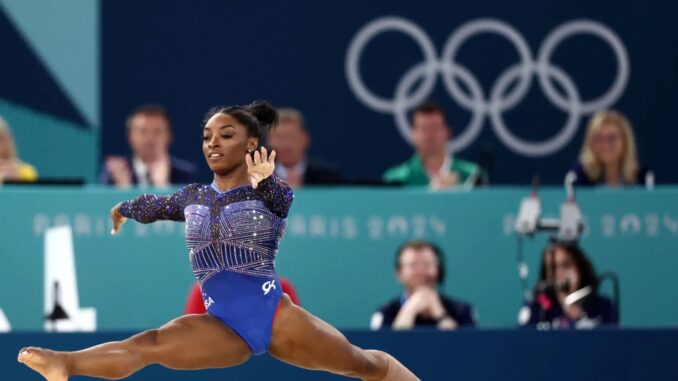
“Gaines and Biles both got personal in their recent public dispute online, but Biles apologized and Gaines did not,” Cwynar said. “Responses to apologies such as Gaines’ latest tweet about Biles deactivating her account set a bad example and could discourage people from apologizing when it makes sense to in their own lives.” Cwynar emphasized that apologizing “requires courage,” and that when people are met with continued attacks after issuing an apology, it “sends a message that vulnerability is met with contempt.”
This could cause people to think twice about owning up to their mistakes or about expressing regret, she said. “It also shows that Ms. Biles was reflective and able to reflect on her comments while Gaines wants to continue the fight,” Cwynar said, adding that Gaines’ actions show she hasn’t come to terms with why leveling personal attacks that hit “below the belt” is not productive.
It’s important to keep in mind that online bullying can “have devastating effects on anyone, regardless of their public status,” Cwynar later noted. “It can lead to anxiety, depression and a profound sense of isolation. For someone like Biles, who is under a spotlight, those effects may be magnified,” she said.
Taking a social media break can be a “healthy” choice for some people, Cwynar said. Generally speaking, Cwynar said that deactivating social media accounts can be a “healthy way to manage one’s mental health” after facing any kind of online harassment. “Taking a break from the negativity allows individuals to regroup, reflect and heal without the constant influx of harmful messages,” she said. “It’s a proactive step in prioritizing mental well-being and can provide much-needed space to regain control over one’s emotional state.”
Cwynar noted that while social media may offer a lot of positive benefits, research has suggested that it can have a “detrimental impacton self-confidence and self-esteem.” “We need to be kind to one another and be open to differing opinions, but not resort to insults,” she said. “Gaines is entitled to her voice as well, but taunting an individual is not necessary.”
In the world of sports, apologies are more than just words — they’re statements of accountability and maturity. So when Olympic gold medalist Simone Biles issued an apology, many expected a mutual show of grace. But what followed from Lia Gaines wasn’t unity — it was something much colder. And that’s where this story takes a controversial turn.
Why This Story Matters Right Now
It’s not just about two athletes. It’s about the example being set — for fans, for young athletes, and for a culture that’s struggling to define what forgiveness and leadership truly mean.
The Background – What Sparked the Controversy?
The Initial Conflict Between Gaines and Biles
Simone Biles, the most decorated gymnast of all time, found herself under scrutiny after comments or actions (depending on the source) that sparked backlash — particularly from right-wing critics and former athletes like Lia Gaines. The backlash wasn’t just political; it was deeply personal.
Biles’ Public Apology
In a heartfelt public statement, Biles took responsibility for her words, acknowledging the impact and offering what many believed was a genuine apology.
Lia Gaines’ Reaction? Silence… and Then Rejection
Rather than accepting the apology or using the opportunity to build a bridge, Gaines chose to double down — through subtle jabs, online reposts, and in some cases, outright dismissiveness.
What Makes Gaines’ Reaction So Problematic?
Ignoring an Apology Sends a Message
When someone offers a sincere apology and it’s rejected or ignored, it teaches others that grudges are more powerful than growth.
The Power of Influence
Gaines, like Biles, is a role model. And whether she meant to or not, her actions signal to young fans and future athletes that humility and grace might not matter.
A Breakdown of the “Bad Example”
Setting a Standard of Hostility
In high-profile spaces, grace isn’t optional — it’s leadership. Gaines could’ve acknowledged Biles’ courage in apologizing. Instead, she fanned the flames of division.
Social Media’s Role in Amplifying Negativity
Gaines’ responses — through retweets, Instagram stories, and public commentary — didn’t just stop the conversation; they weaponized it.
Choosing Ego Over Empathy
Rather than showing emotional intelligence, Gaines showed emotional resistance. And that choice echoes far beyond a single interaction.
How the Public Reacted
Divided Audiences
Some supported Gaines for standing her ground. Others criticized her for refusing to accept Biles’ apology, especially when it was clear the gymnast was trying to make amends.
The Media Storm
From Twitter threads to YouTube commentaries, the media jumped on the story — with most headlines questioning Gaines’ intentions and emotional maturity.
What Biles Did Right
Accountability in Action
Simone Biles didn’t have to apologize. She could’ve deflected or gone silent. Instead, she chose vulnerability — a move that showed character and strength.
A Lesson in Maturity
In a world where being “right” often trumps being kind, Biles showed how maturity can win — even in defeat.
Missed Opportunity for Unity
A Public Display of Grace Could’ve Inspired Millions
Had Gaines responded with understanding, the narrative would’ve changed from drama to growth — from rivalry to resolution.
Bridging Gaps Instead of Widening Them
Instead, the opportunity for a teachable moment was lost — and what remained was a sharp divide between two powerful voices in sports.
The Bigger Picture – Why This Matters Beyond Sports
Cultural Impact of Role Models
Young athletes are watching. Fans are listening. And the behavior of public figures sets a tone that often bleeds into real life.
Forgiveness Isn’t Weakness
In fact, it’s one of the strongest moves a person can make. But when it’s withheld, it becomes a form of silent aggression.

How to Move Forward From Conflict Like This
Accepting Apologies Publicly and Privately
Accepting doesn’t always mean agreeing. But it shows the world that peace matters more than pride.
Using Platforms to Heal, Not Hurt
Gaines had a platform and a choice. Influencers and athletes must remember: your response can either heal wounds or make them deeper.
What Gaines Can Still Do
Re-engage with Compassion
It’s never too late. A simple acknowledgment of Biles’ apology — even now — could start a new narrative.
Lead with Emotional Intelligence
Sports don’t just shape bodies. They shape hearts. And leading with empathy is how true icons are made.
Conclusion: What We Should Learn From This
This wasn’t just about two athletes. It was a masterclass in character, accountability, and what it means to be a public figure in the age of digital magnification. Simone Biles did what many wouldn’t — she stepped up, owned her mistake, and apologized. Lia Gaines, however, missed a golden opportunity to meet that moment with grace.
